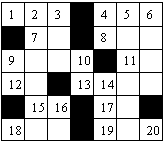
The definitions correspond to the rectangular grid by means of sequential integers on "eligible" white squares. White squares with black squares immediately to the left or above them are "eligible." White squares with no squares either immediately to the left or above are also "eligible." No other squares are numbered. All of the squares on the first row are numbered. The numbering starts with 1 and continues consecutively across white squares of the first row, then across the eligible white squares of the second row, then across the eligible white squares of the third row and so on across all of the rest of the rows of the puzzle. The picture below illustrates a rectangular crossword puzzle grid with appropriate numbering.

An "across" word for a definition is written on a sequence of white squares in a row starting on a numbered square that does not follow another white square in the same row. The sequence of white squares for that word goes across the row of the numbered square, ending immediately before the next black square in the row or in the rightmost square of the row.
A "down" word for a definition is written on a sequence of white squares in a column starting on a numbered square that does not follow another white square in the same column. The sequence of white squares for that word goes down the column of the numbered square, ending immediately before the next black square in the column or in the bottom square of the column. Every white square in a correctly solved puzzle contains a letter.
You must write a program that takes several solved crossword puzzles as input and outputs the lists of across and down words which constitute the solutions.
2 2 AT *O 6 7 AIM*DEN *ME*ONE UPON*TO SO*ERIN *SA*OR* IES*DEA 0
puzzle #1: Across 1.AT 3.O Down 1.A 2.TO puzzle #2: Across 1.AIM 4.DEN 7.ME 8.ONE 9.UPON 11.TO 12.SO 13.ERIN 15.SA 17.OR 18.IES 19.DEA Down 1.A 2.IMPOSE 3.MEO 4.DO 5.ENTIRE 6.NEON 9.US 10.NE 14.ROD 16.AS 18.I 20.A